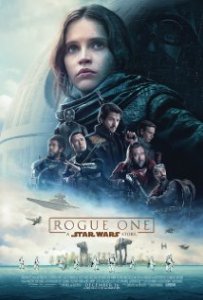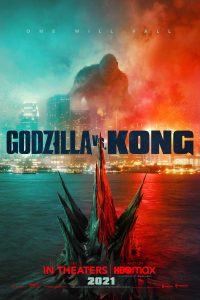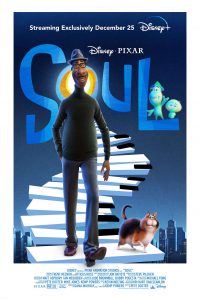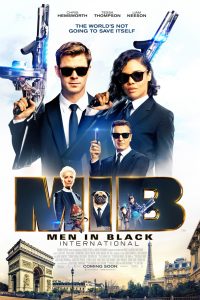“I Have a Bad Feeling About This”:A Review of Rogue One: A Star Wars Story
 by Gary Westfahl
by Gary Westfahl
Rogue One: A Star Wars Story provides precisely what it promises – a professionally-rendered, authentic Star Wars story – and enthusiastic devotees of the Star Wars universe will probably be pleased by the results; indeed, in the theatre where I watched it, its conclusion was greeted with scattered applause. However, filmgoers who are not diehard fans, and who were not entirely thrilled by Star Wars: The Force Awakens (2015 – review here), may be bored and appalled by this latest installment of the venerable franchise. My own feelings are aptly conveyed by some of the titles I considered for this review – “One for the Money,” “Same Old Story, Same Old Song and Dance,” “The Star Wars Holiday Slaughter” – suggesting the various reasons why I found myself loathing this film.
The film is a direct prequel to the original Star Wars (1977) – now identified as Episode IV: A New Hope – which explains why the word “hope” keeps coming up; and it sets out to answer the question that nobody who watched that film ever asked: just how did the rebels get a hold of those plans for the Death Star? And the answer, predictably, is that it was due to the efforts of a plucky band of rebels, battling against impossible odds. One might describe it, then, as Star Wars: Episode 3 1/2 – or perhaps, Star Wars: Episode 3.9, because who knows how many additional films might be created that are set in the period between the third and fourth films. It brings back some cherished characters from the original trilogy (and less cherished characters from the later prequels), but it would be a shame to identify them (with one exception below), since being surprised by their regrettably brief appearances constitutes one of the few pleasures that many will derive from watching the film.
To understand why viewers may have a “bad feeling” about this film, it is useful to recall a term coined by film reviewer Nick Lowe: “plot coupons.” To set, and keep, their stories in motion, authors can announce that, to achieve some desired goal, their heroes are required to visit some special place, encounter some special person, or retrieve some special object; having garnered such a “plot coupon,” they then typically discover that another task of a similar nature awaits them, and the game continues until the story has achieved a satisfactory length. It is true, as David Langford notes in John Clute and John Grant’s The Encyclopedia of Fantasy (1997), that the goals in certain stories have evocative resonances that elevate them above the status of expedient devices, like Dorothy’s quest to return home in The Wizard of Oz (1939) and J. R. R. Tolkien’s One Ring; but this is definitely not the case with the contrived plot coupons that inspire each and every single action in this film. For example, without really offering any “spoilers,” I can report that, in the film’s final scenes, one group of heroes is on the ground seeking to obtain a plot coupon – which will prod a second group of heroes in the sky to obtain another plot coupon – which will enable a third group of heroes within an enemy stronghold to obtain a third plot coupon. It is an insult to the field of mathematics to describe such stories as “formulaic,” since actual mathematical formulas tend to be a bit more complex.
This film is disappointing not only because it is so mechanically constructed, but also because one can envision a virtually infinite series of future Star Wars films in which, as in this film, (hero A) must travel to (planet B) in order to obtain (plot coupon C), only to learn that it is now necessary to travel to (planet D) in order to obtain (plot coupon E). After all, one can easily find in this film, and other films, many other questions that nobody has asked: how did scientist Galen Erso (Mads Mikkelsen) get involved in building a Death Star, and what inspired him to turn against the Empire? How did Chirrut Îmwe (Donnie Yen) become blind, and what led to his friendship with Baze Malbus (Wen Jiang)? All one has to do is to invent plot coupons to get them moving, and the possibilities are sadly endless, as long as the audiences keep showing up.
One might tolerate this film’s arbitrary narrative if it involved genuinely appealing characters, but none of its newly-crafted heroes are truly memorable. The film devotes an ample amount of time to the back story of protagonist Jyn Erso (Felicity Jones), but she is so disappointingly similar to Star Wars: The Force Awakens’s Rey that she never comes to life as a character in her own right. And if you are surprised to learn that she first expresses a determination to only look out for herself, but later becomes utterly dedicated to fighting for the rebellion, you have never watched a Star Wars film. (A character observes that her “behavior is continually unexpected,” but precisely the opposite is the case.) All of the other new heroes, it seems, were each allotted no more than two minutes to establish why we should love them, and then the filmmakers, confident that we’ll now be rooting for these stalwarts, go back to moving them around like pieces on a chessboard. Three of Jyn’s companions – Cassian Andor (Diego Luna), Baze Malbus, and Bodhi Rook (Riz Ahmed) – are merely dull, but blind swordsman Chirrut Îmwe is actively annoying, a character inanely stolen from Japanese action films and utterly out of place in this film. Occasional lines of dialogue suggest characters with emotional depths: “There is more than one sort of prison. I sense that you carry yours wherever you go.” “You’re not the only one who lost everything.” “I’m not used to people sticking around when things go bad.” But we know so little, and care so little, about these characters that these pronouncements have no impact at all, serving only to prolong the welcome respites between recurring gun battles.
Overall, while I realize that I was supposed to find them endearing, I instead began longing to watch all of these characters die on the screen, since that would greatly decrease the chance that they would someday blight another Star Wars film. It is also significant that characters from previous films, not any of this film’s pallid stars, are featured in the film’s final scenes. Still, there is one halfway likable character that might merit a revival – the robot K-2SO (Alan Tudyk) – though he is blatantly derivative, combining C-3PO’s witticisms with R2-D2’s technological savvy in one convenient package. (And didn’t Tudyk play a similar character in I, Robot [2004 – review here]?)
Considering this film’s cast leads me to an unexpected conclusion: one imagines that franchises like Star Trek and Star Wars are popular primarily because of their fascinating and richly developed universes – and such backgrounds in themselves might be enough to sustain a television series, novel, or video game. But feature films may require strong, involving characters as well. Thus, the Star Trek film franchise floundered when it attempted to rely on the generally boring cast of Star Trek: The Next Generation (1987-1994), but came to life again when they brought back the more interesting characters from the original series. In the case of the Star Wars franchise, its two recent films make me suspect, more than ever, that the original trilogy succeeded in large part because of its wonderful group of characters – Luke Skywalker, Princess Leia, Han Solo, Chewbacca, Obi-Wan Kenobi, C-3PO, and R2-D2. The mixture of new and old characters in the prequels never worked quite as well; Star Wars: The Force Awakens was mostly enjoyable because of the sustained participation of Harrison Ford’s Han Solo, aided and abetted by Peter Mayhew’s Chewbacca and Carrie Fisher’s Leia; and this film is not enjoyable because old, familiar friends are observed only fleetingly. To keep the franchise alive in decades to come, then, producers may be well advised to stop striving to develop ineffectual new characters and instead, like Star Trek, hire new actors to portray its original cast in new adventures.
Despite its novel characters, Rogue One: A Star Wars Story seems determined in many ways to emulate previous Star Wars films, right down to beginning the film with “A long time ago in a galaxy far, far away …” and having a character say, “I have a bad feeling about this” (though he is at least cut off before uttering the final two words). Menacing walkers and the Death Star return; there are yet another version of the cantina scene, more groups of fighter pilots identified by different colors, storm troopers threatening on multiple occasions, and distinctively odd aliens lurking in the background. But director Gareth Edwards has departed from the pattern of Star Wars in one noteworthy way. In the other films, the characters faced several different sorts of challenges, and one could never complain about any “gratuitous violence.” But that is precisely the element that Edwards, having already demonstrated his indifference to mass murder in Godzilla (2014 – review here), is now adding to the Star Wars franchise. Again and again and again, the peril facing Jyn and her allies is that a group of enemies is trying to kill them; again and again and again, they are obliged to respond by slaughtering all of them; and the weapons of choice, unimaginatively, look very much like ordinary machine guns. In fact, for someone who is not paying attention to the nuances of the plot, the entertainment provided by this film could be accurately summarized as “watching seven hundred people get killed.” No, I didn’t actually count all the corpses, but if I am ever forced to see this film again, I may divert myself by endeavoring to tally them up.
Reflecting its nonstop bloodshed, the film is also unlike other Star Wars films in its visual gloom; one associates earlier films with bright, daytime landscapes and well-lit interiors, but these characters seem to spend most of their time enduring pouring rain and dark, confining rooms; the final battle occurs on a sunny day, one suspects, solely because our heroes must see what they are doing. In addition, Edwards’s film is almost entirely devoid of humor. Yes, K-2S0 has a few funny lines, and Churrit offers a single joke, but otherwise the characters all maintain stone faces throughout the film – contrasting sharply with the original trilogy, enlivened by Han Solo’s constant wisecracks, C-3PO’s amusing complaints, and Princess Leia’s sarcasm; at times, Chewbacca and R2-D2 could inspire laughter with well-timed bursts of inarticulate sound. One might defend Edwards’s film on the grounds that, instead of keeping everything light, he is endeavoring to finally produce a grown-up Star Wars film; but – let’s face it – Star Wars has never been, and can never be, a grown-up world. It is like striving to produce Mickey Mouse’s Dungeon, or Elena of Armageddon. There is perhaps some irony in one character’s statement that “I’m beginning to think the Force and I have different priorities” – for it certainly seems like George Lucas and Gareth Edwards have different priorities.
I should also address the rumors that the film did some last-minute shooting in order to incorporate some sort of attack on Donald Trump. All I can say is that, if that was the filmmakers’ intent, they were much too subtle for me, for I discerned nothing in the film that might be interpreted in that manner. The theory also strikes me as unlikely, since in making Godzilla, Edwards was visibly determined to avoid saying anything that might offend somebody, and I can’t imagine that he would weaken this film’s chances for success by criticizing a president-elect who received over 62,000,000 votes. More broadly, as I indicated while reviewing Star Wars: The Force Awakens, I see no meaningful parallels between the starkly Manichean world of Star Wars and our own, more complicated real world, and imagining that such parallels exist – regarding one’s own group as entirely good, and one’s opponents as entirely evil – is both inaccurate and dangerous.
If this film has any message at all, it is the less than controversial point that fathers should love their daughters, and daughters should love their fathers. To drive the point home, Jyn is provided with both an actual father, Galen Erso, and a surrogate father, Saw Gerrera (Forest Whitaker); avenging the wrongs done to them becomes the main reason that she fights for the rebellion, and when she has completed a mission, Cassian pays her the ultimate compliment by saying, “Your father would have been proud of you.” At times, characters dispense uplifting platitudes on other subjects, all designed to create the impression that this movie is actually about something – even though it is not.
The only interesting issue raised by the film actually has nothing to do with its plot, but rather involves a disturbing advancement in its special effects. It seems that the producers wanted to have Peter Cushing reprise his role as the sinister Grand Moff Tarkin – despite the fact that Cushing died twenty-two years ago. The solution to this apparently insurmountable problem was to hire another actor, Guy Henry, and employ cutting-edge technology to make him look exactly like Cushing. This was done with the permission of Cushing’s estate, which is duly acknowledged in the closing credits, but whenever Henry appeared, I was jolted out of my limited engagement with the story by the realization that I was watching a living simulacrum of a dead man. I suppose this is not really different from editing footage of dead actors into television commercials, but I still found it unsettling – the spectacle of an actor being forced to appear in a film without his permission. Further, the same technology could be employed to re-create living actors; so, if Daniel Craig continues refusing to play James Bond again, producers could invoke a clause in his contract allowing them to use his image and have him star in the next James Bond film anyway. All in all, I definitely think that what was done with Cushing raises ethical questions that need to be debated before this practice becomes commonplace.
All things considered, this particular review will probably be ignored, but I may be subjected to harsh rebuttals from Star Wars fans, angered by my obstinate refusal to acknowledge what a marvelous film this was. But I already said that if you really like Star Wars films, you will probably like this one; I merely happen to be one of those people who is finding less and less to like about Star Wars films, and I am obliged to provide my honest reactions. And, if more films like Rogue One: A Star Wars Story keep appearing, I believe that the numbers of such disillusioned viewers are likely to grow.








I enjoyed the film and I enjoyed your review. I finally felt that the Star War universe was messy–like life.
I completely agree with your assessment of the movie. You could not have expressed my thoughts any better. I’m just surprised to see how many people feel just the opposite.